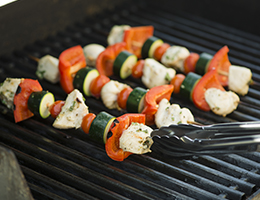
Gathering outdoors with family and friends for good times and good food—now that's what grilling is all about.
But there's something you should know before your next barbecue: Grilling meats is linked to an increased risk of cancer. Here's why—and what you can do to counter this potential concern.
The issue: High heat and meats
Grilling exposes meat to very high heat, which causes certain chemicals to form. Laboratory studies show that these chemicals (some of which are also found in tobacco smoke and car exhaust) can alter DNA molecules, the National Cancer Institute reports. These DNA changes, or mutations, have the potential to cause cancer.
When grilling, these cancer-linked chemicals form in two ways:
- When proteins in the meat react to the heat of the grill.
- When fat and juices from the meat drip onto the hot grill and coals, causing smoke and flames to flare up. Chemicals in the erupting smoke and flames then stick to the meat.
There's another way grilling is linked to cancer: Cookouts often feature red and processed meats. The problem with that? Frequently eating red meat can increase your risk of colorectal cancer, the American Institute for Cancer Research reports. And even small amounts of processed meats, like sausage and hot dogs, can raise your risk when eaten regularly.
Here's to healthier grilling!
If you want to enjoy grilling with less cancer risk, consider these tips:
Marinate first. Marinating makes meat more tender and flavorful—and it may also help keep cancer-linked chemicals from forming.
Don't char the meat. Start by choosing lean cuts of meat. And trim as much fat as you can see. This way there's less fat to drip and cause flames to flare up. If possible, avoid cooking the meat directly over flames.
Shorten cooking times. Reducing the time that meat stays on the grill may reduce the amount of cancer-linked chemicals that form.
You can cook meat faster by:
- Precooking meats prior to grilling. Then you can finish them on the grill.
- Turning the meat often.
- Cutting the meat into smaller portions.
Don't eat the blackened parts. If part of the meat does char, remove that part and eat the unburned portion.
Grill more fruits and veggies. Here are just a few great options: corn on the cob, peppers, asparagus, mango, peaches and pineapple.
Think beyond the grill
Changing what you eat overall can help reduce your risk of cancer. A cancer-protective diet is one that emphasizes a variety of plant-based foods like fruits, veggies and whole grains, according to the American Cancer Society.
Other everyday habits may also help lower your cancer risk. Check out these steps to help you avoid cancer.
Reviewed 10/4/2024
Sources
- American Cancer Society. "American Cancer Society Guideline for Diet and Physical Activity." https://www.cancer.org/cancer/risk-prevention/diet-physical-activity/acs-guidelines-nutrition-physical-activity-cancer-prevention/guidelines.html.
- American Institute for Cancer Research. "Five Steps for Cancer-Safe Grilling." https://www.aicr.org/news/five-steps-for-cancer-safe-grilling.
- American Institute for Cancer Research. "Mediterranean Marinades for Healthier Grilling." https://www.aicr.org/news/25132.
- American Institute for Cancer Research. "Practicing Safe Grilling Can Reduce Cancer Risk, Experts Say." https://www.aicr.org/news/practicing-safe-grilling-can-reduce-cancer-risk-experts-say.
- National Cancer Institute. "Chemicals in Meat Cooked at High Temperatures and Cancer Risk." https://www.cancer.gov/about-cancer/causes-prevention/risk/diet/cooked-meats-fact-sheet.